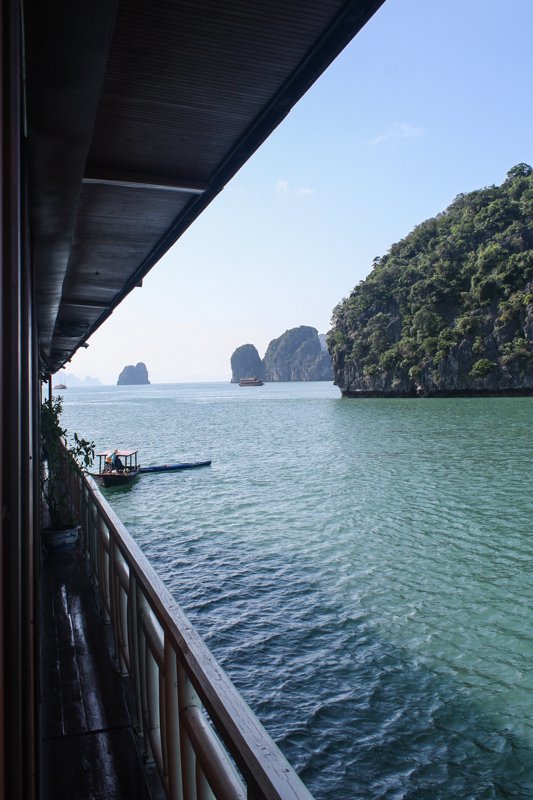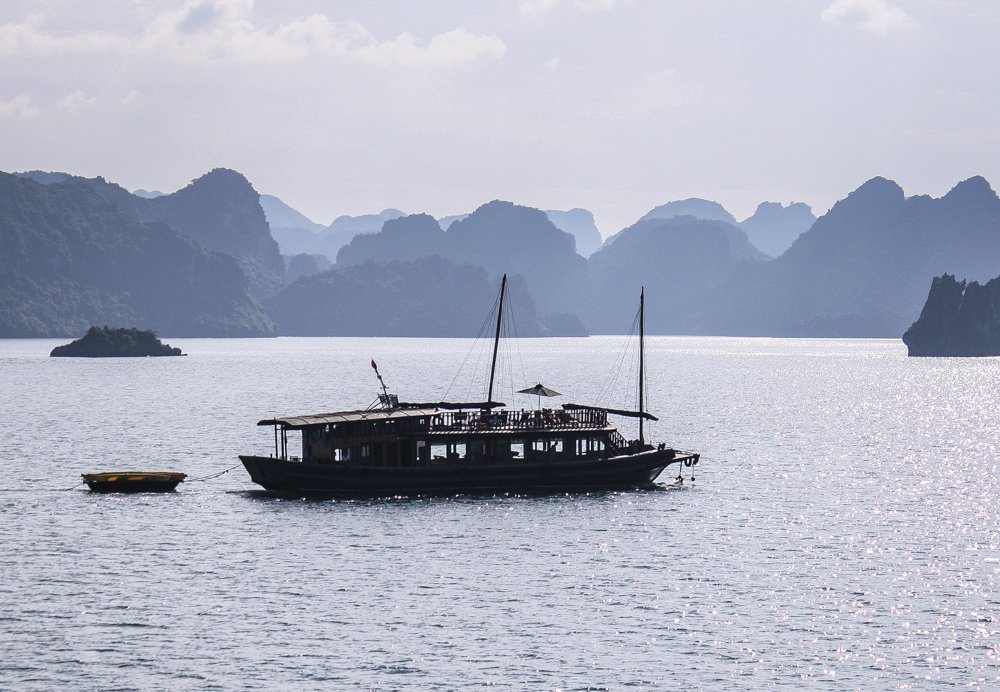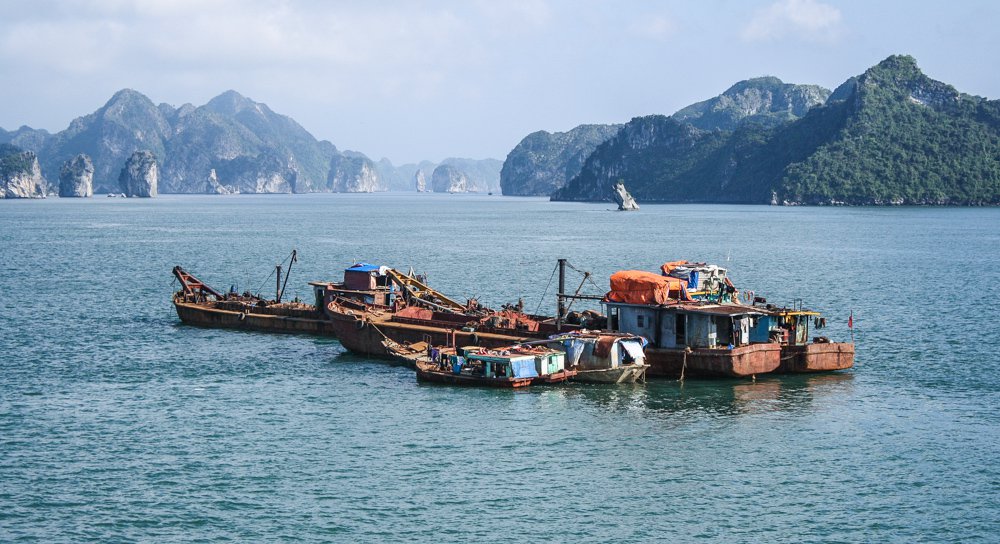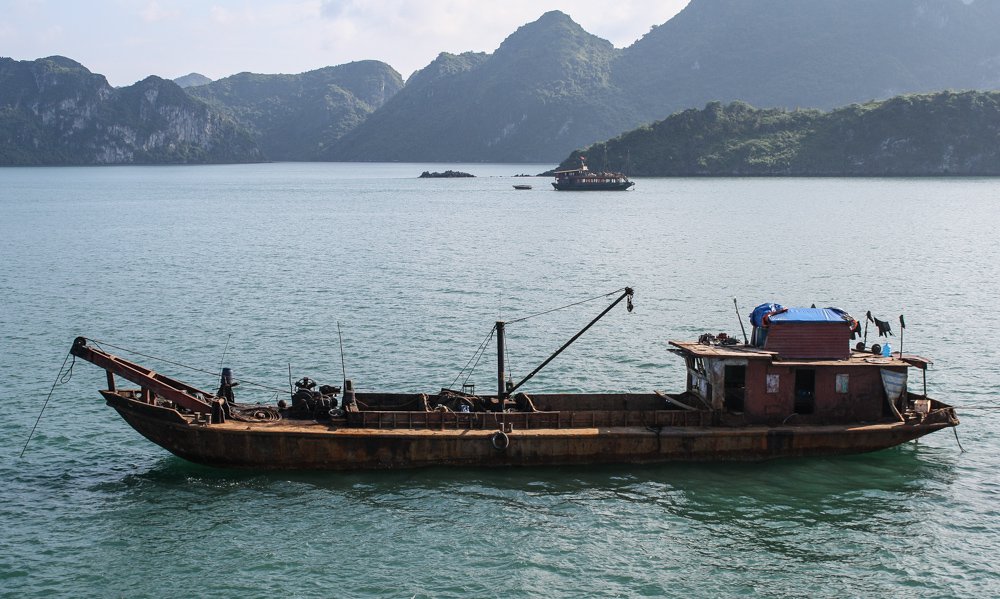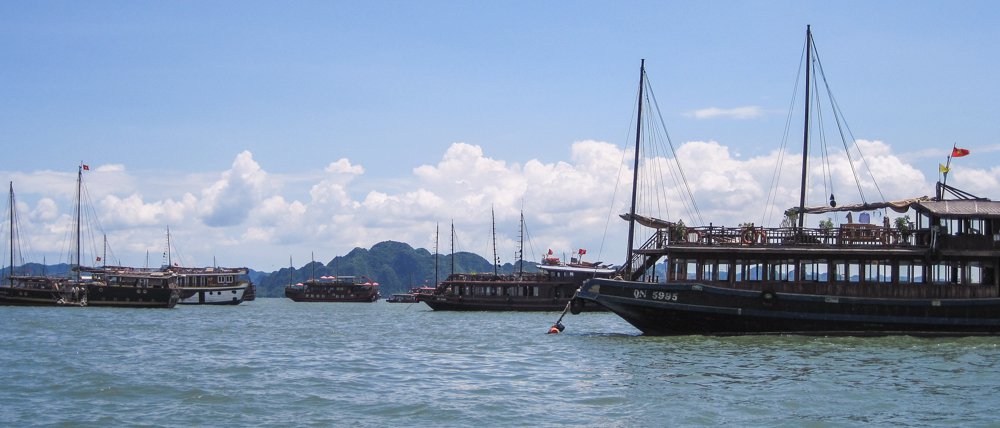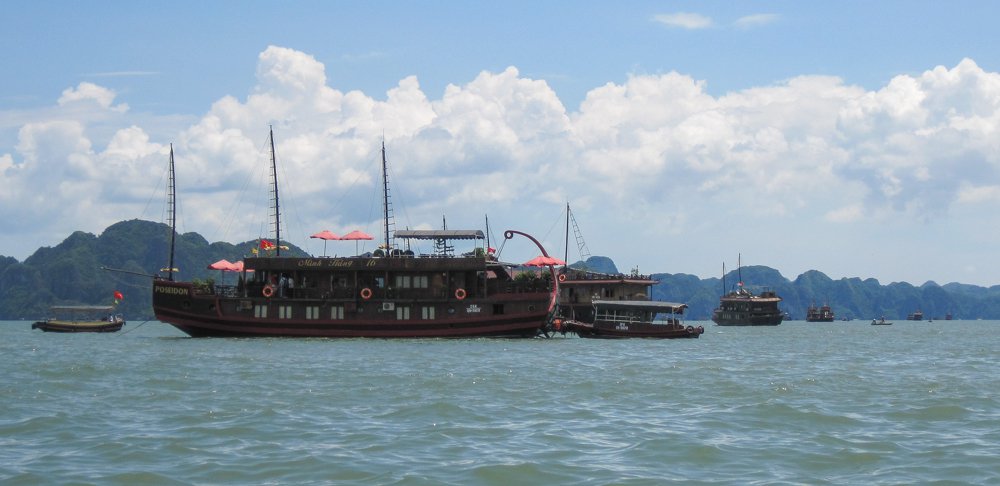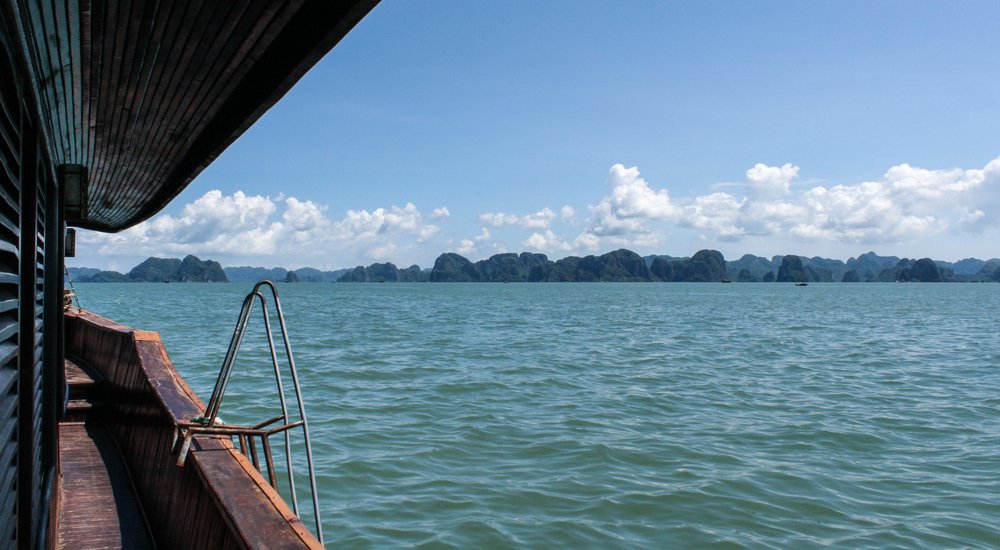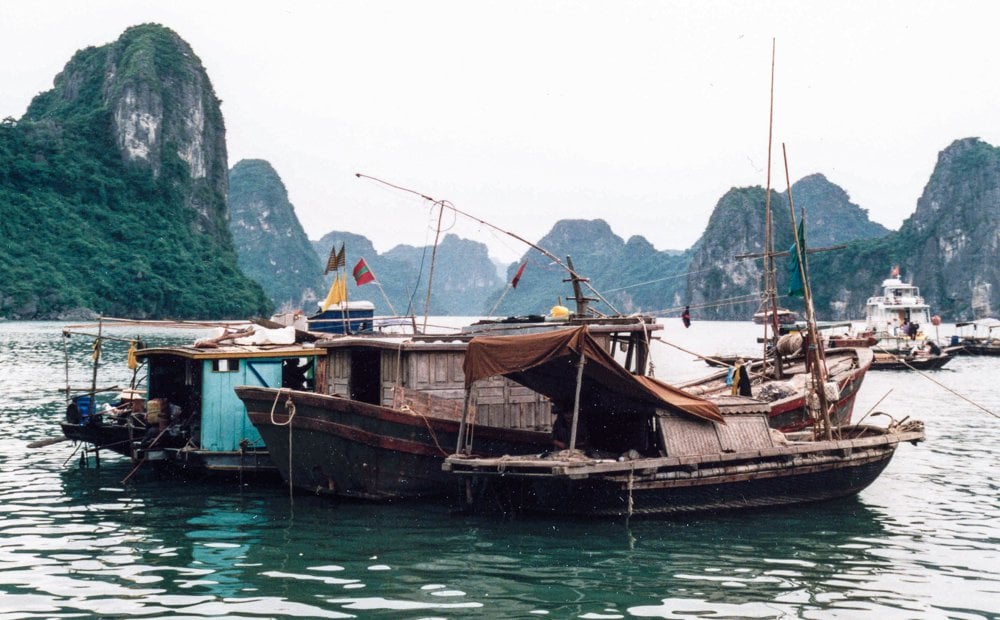
Ha Long Bay
Ha Long Bay (literally: Bay of Descending Dragons; Vietnamese: Vịnh Hạ Long) is the most well-known touristic destination in Viet Nam, and this is for good reason. It is a UNESCO World Heritage site located in Quảng Ninh province. If you've focused your trip on the extraordinary cities and monuments of urban Vietnam, a visit to Ha Long Bay leaves no doubt that Vietnam also has some of the most beautiful natural sceneries worldwide. The bay features thousands of limestone karsts and isles in various sizes and shapes. The Ha Long bay, dotted with some 2000 limestone islets rising from emerald waters, is the best known natural wonder of Viet Nam.
The islands were formed from limestone sediments deposited at the bottom of an ancient ocean. As the seas rose and fell over millennia, the soft limestone was easily shaped into the towering monoliths (geologists call them karst formations) as we see today. The forces of erosion also riddled the islands with caves, more than 20 of which are open to tourists. Because of their precipitous nature, most of the islands are uninhabited and unaffected by a human presence. The outstanding scenic beauty is complemented by its great biological interest. The islands feature endless numbers of beaches, grottoes, and caves. The bay is a sea islands in tropical wet with 2 seasons: hot and moist summer, dry and cold winter. Average temperature is from 15°C- 25°C. Annual rainfall is around 2000mm. In the shallow waters of the bay, there are more than 200 species of fish and 450 different kinds of molluscs. Often the shape of an island determines its name, such as Voi Islet (elephant), Ga Choi Islet (fighting cock), and Mai Nha Islet (roof). Birds and animals, including antelopes, monkeys, and iguanas, also live on some of the islands. Cat Ba Island is a UN Biosphere Reserve and home to many rare species.
Archaeological evidence reveals that humans have settled near Ha Long Bay since at least 3,000 B.C. The bay is no stranger to conflict. In 1288 General Tran Hung Dao stopped Mongol ships from sailing up the nearby Bach Dang River by placing steel-tipped wooden stakes at high tide, sinking the Mongol fleet. Today General Tran Hung Dao (Hung Dao Vuong) is revered throughout Vietnam. You can visit the Dau Go (Cave of the Wooden Sticks), where legend says the wooden sticks that sank the Mongol fleet were stored. Tour to Ha Long Ha Long Bay is a major tourist destination, but don't be discouraged by the crowds. The area is large enough to have place for everyone, if your travel is well-planned. Peak season is May to October, when visibility is at its best, although it's also the hottest time of the year.
The bay is about four hours drive from Hanoi. Instead of taking slow and sometimes unsafe local buses, rent a car, take a special tourist bus, or book a tour with pick-up from Ha Noi. Most visitors do an overnight stay on a floating junk in the bay or in the town of Cat Ba on Cat Ba Island, but day trips are also possible. The easiest – and also recommendable - way to visit Ha Long is to take a tour from Ha Noi, which includes pick-up from Ha Noi, cruising Ha Long and stay overnight on the boat, with full-board service and transfer back, to the city or to the airport. The itinerary of a so called two-days, one-night tour looks as follows:
• Day 1: Ha Noi – Ha Long 8:00 pick-up in Ha Noi, drive to Ha Long, 12:30 embark the cruise boat, 13:00 start cruising and having lunch, visit caves, visit fisherman floating village, go kayaking, go swimming, 19:00 dinner, 21:00 octopus fishing or relax, stay overnight on the cruise ship or junk.
• Day 2: Ha Long – Ha Noi Next day, 06:00 start the day with some early sport, 07:00 breakfast, cruising back to pier, 12:30 back to pier and disembark, lunch, 14:00 driving back to Ha Noi city or airport. The cost of different luxury levels of the cruise ship is 40 USD to 180 USD. The service and accommodations on boat tours ranges from bare bones (Huong Hai) to luxury (Emeraude, Emotion), but paying more will give you a better experience. A great way to explore and see the bay is by kayak. You can choose where you want to go, and the bay's waters are smooth and suitable for beginners. Ask locally for places to rent kayaks, if your tour doesn't include kayaking. Caves in Ha Long Bay You can have a wonderful visit to Ha Long Bay even if you never step foot off a cruise boat, but you won't want to miss the extraordinary caves within the islands. In most of the caves are stalactites .and stalagmites, which appear like subterranean icicles. Stalactites form from the top down and stalagmites form from the bottom up Here are some of the better known caves:
• Sung Sot Cave (Surprise Cave): One of the largest and most impressive of the caves, the Surprise Cave was given its name by the astonished French explorers who discovered it in 1901. Fifty steps lead up to the cave entrance. From there you'll proceed through three progressively larger grottoes, each festooned with stalactites and stalagmites that take on different shapes, such as a dragon, tiger and penguin. Once you emerge from the caves you'll be rewarded with a spectacular view over the bay below.
• Dau Go Cave (Cave of the Stakes): According to legend, the wooden stakes that General Tran Hung Dao used to stop the Mongol fleet were stored here. The cave consists of three chambers. The first features a massive pillar that appears to be a monk holding a cane. A second, narrow chamber leads to a huge third grotto, with spectacular animal-shaped rock formations. For good reason early French explorers called it "Grotte des merveilles"-the cave of marvels.
• Trinh Nu Cave (Virgin Cave): A story is told that rather than marry an old king, a beautiful local girl fled to this cave and committed suicide by turning herself into a rock formation within the cave. Virgin Cave tunnels through the island above for more than a mile, with numerous beautiful chambers on either side.Your tour boat will likely stop near Virgin Cave for the night.
• Thien Cung Grotto (Heaven Palace Grotto): Climbing steep stairs through thick forest, visitors to the Thien Cung Grotto enter a huge chamber adorned with stalactites and stalagmites of all kinds. This is a popular cave for day trippers on their way to Cat Ba Island. Other caves you may want to visit include: Trong Cave (Drum Cave), Tam Cung Cave (Three Palace Grotto), Bo Nong Cave (Pelican Cave). Other places of interest
•Floating fishing villages A community of around 1,600 people lives on Ha Long Bay in several floating fishing villages. You can see them from boat tours or on your own by kayak. The residents of the floating fishing communities are intimately connected to the sea throughout their lives
•Cat Ba Island Cat Ba is, at 87 square miles, the largest island in the bay and the main overnight hotel stop on inexpensive package tours.Approximately half of the island's area is covered by a national park-also a UN Biosphere Reserve, which is home to the highly endangered Cat Ba langur. This golden-headed langur is rarely seen, as fewer than 100 specimens are thought to survive in the wild, although it is the subject of a well-organized conservation program. Other mammals in the park include civet cats and oriental giant squirrels. The park faces the constant challenge of protecting its biodiversity while encouraging tourism. Although there is much beauty to explore on the island, Cat Ba town itself (pop. 8,000) has less to offer visitors. Many of the tours of Ha Long Bay include Cat Ba, so getting to the island is easy.

